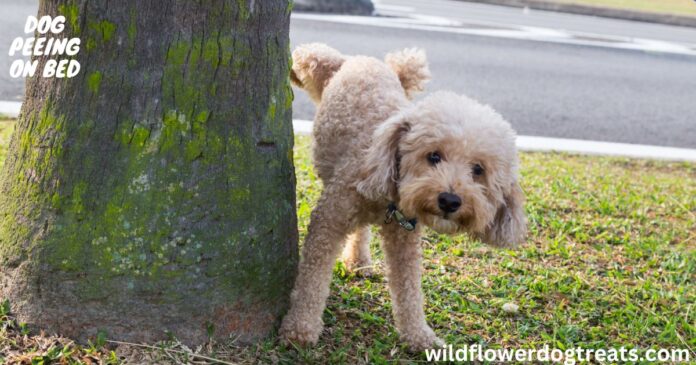Your dog may have peed on your bed due to a medical issue, anxiety, or territorial marking. dog peeing on bed. It’s essential to rule out any health problems and address any stress or behavioral issues.
Finding your dog’s unexpected mess on your bed can be frustrating and confusing. Many factors could have led to this behavior, including medical issues, anxiety, or marking territory. Understanding why your dog peed on your bed will help you address the problem effectively and prevent it from happening again.
You will learn about the potential reasons behind your dog’s behavior and what steps you can take to resolve the issue. By identifying the underlying cause, you can ensure a happy and healthy relationship with your furry companion.
Canine Instincts And Behavior
Understanding canine instincts and behavior is crucial for addressing various unexpected actions and reactions of our beloved pets. Dogs are known to follow their natural instincts and exhibit certain behaviors that may seem puzzling. In this context, exploring the reasons behind your dog peeing on your bed in terms of their instincts and behavior can provide valuable insights into your pet’s actions.
Territorial Marking
Dogs have a natural inclination to mark their territory, and urinating is one way for them to establish their ownership of a particular space. This behavior is particularly common among unneutered males, but females may also engage in territorial marking to communicate their presence and claim a specific area as their own.
Separation Anxiety
Separation anxiety is a significant factor that can lead to a dog urinating on your bed. When dogs experience distress and anxiety as a result of being separated from their owners, they may resort to urinating in areas that carry their owner’s scent, such as the bed. This behavior serves as a way for the dog to feel closer to their absent owner and alleviate their anxiety.
Communication Through Scent
Dogs communicate with each other and with their human companions through scent. Their sense of smell is highly developed, allowing them to pick up on various scents and interpret them to understand the world around them. Therefore, it’s not uncommon for a dog to mark its territory or convey a message through scent, which can result in them peeing in unexpected places such as your bed.
How Dogs Use Scent
Dogs use scent to gather information about their environment, mark their territory, and communicate with other dogs. When a dog pees in a particular spot, they are leaving behind their scent, which can convey messages to other dogs and humans. This behavior is natural for dogs and is a way for them to assert their presence and mark their territory.
The Significance Of Peeing Locations
The locations where a dog chooses to pee hold significance in their communication through scent. Certain areas may be targeted by a dog because they want to claim that space as their own, or they might be trying to convey a message. For example, if your dog pees on your bed, it could be attempting to assert dominance or seeking comfort and security by leaving its scent in a place that carries your scent.
Behavioral Triggers
Behavioral triggers can play a significant role when trying to understand why your dog may have peed on your bed. Dogs, like humans, can exhibit behavioral issues for various reasons. Stress, anxiety, and inadequate housetraining often trigger undesirable behavior such as urinating on the bed. These emotional factors can lead a dog to act out unexpectedly, manifesting in behaviors like bed-wetting. Changes in the household, such as a new pet or family member, or loud noises like thunderstorms or fireworks, can trigger stress or anxiety in your dog. Separation anxiety is another common cause of stress-related urination, especially when your dog feels distressed when left alone for extended periods.
Inadequate Housetraining
Inadequate housetraining is a primary factor behind indoor accidents. If your dog has not been properly or consistently trained to relieve themselves outdoors, they may resort to urinating inside the house, including on your bed. Other factors, such as a medical condition or old age, can also contribute to housetraining issues. It’s essential to revisit your pet’s housetraining routine and reinforce positive behaviors to address this problem.
Health Factors To Consider
When it comes to understanding why your dog may have urinated on your bed, it’s essential to consider various health factors that could be at play. Here are some common health-related issues that could cause your dog to exhibit this behavior:
Urinary Tract Infections
One potential health issue that might lead to your dog peeing on your bed is a urinary tract infection (UTI). UTIs can make it difficult for your dog to hold its urine, leading to accidents in inappropriate places such as your bed. Dogs with UTIs may also exhibit other symptoms such as increased frequency of urination, straining while urinating, or blood in the urine.
Age-related Incontinence
Another health consideration for sudden urination on your bed is age-related incontinence. As dogs age, their bladder control can weaken, causing them to have accidents indoors. This could be due to a weakening of the muscles that control the bladder or a decrease in the production of hormones that help regulate continence.
Addressing The Issue
Dealing with a dog urinating on your bed can be a frustrating experience. However, it’s crucial to address this issue promptly and effectively to prevent it from becoming a recurring problem. Here are some practical methods for addressing the behavior and preventing future incidents.
Positive Reinforcement Training
Positive reinforcement training is a highly effective approach for addressing inappropriate urination behavior in dogs. By rewarding your dog with treats, praise, or play when they urinate in appropriate areas, such as designated outdoor spots or a litter box, you can positively reinforce the desired behavior.
Consistency In Routine And Environment
Consistency is key in preventing your dog from urinating on your bed. Establish a regular routine for bathroom breaks, feeding times, and exercise to create a stable environment for your pet. Additionally, minimizing potential stressors and changes in the environment can help reduce the likelihood of accidents.
Frequently Asked Questions For Why Did My Dog Randomly Pee On My Bed
Why Is My Dog Peeing On My Bed?
Dogs may urinate on the bed due to medical issues, anxiety, or marking behavior. It’s important to rule out any medical problems by visiting a vet. Addressing anxiety and providing proper training can also help prevent this behavior.
How Can I Stop My Dog From Peeing On My Bed?
To prevent your dog from peeing on the bed, ensure they have regular bathroom breaks, restrict their access to the bed, and provide positive reinforcement for using designated bathroom areas. Consistent training, creating a safe and comfortable environment, and seeking professional help if needed can also be beneficial.
Is Peeing On The Bed A Sign Of Dominance In Dogs?
Contrary to popular belief, dogs generally don’t urinate to assert dominance. Instead, it could be due to anxiety, medical issues, or a lack of proper training. Understanding the underlying cause and addressing it accordingly is essential in resolving this behavior.
Why Did My Potty-trained Dog Suddenly Pee On My Bed?
Sudden accidents in a potty-trained dog may be a sign of a health issue, stress, or changes in their environment. Rule out medical issues and consider recent changes for potential stress or anxiety in your dog.
Conclusion
Understanding why your dog randomly peed on your bed is crucial in preventing future incidents. By identifying potential triggers such as stress or health issues, you can provide the necessary support and training. Remember to maintain a consistent routine, offer positive reinforcement, and consult a professional if needed.
With patience and understanding, you can address this behavior and strengthen your bond with your furry friend.




